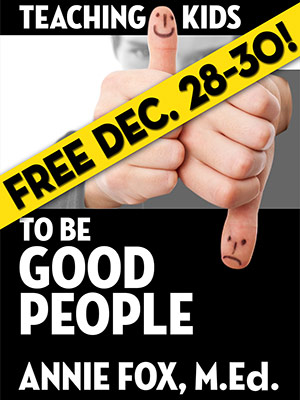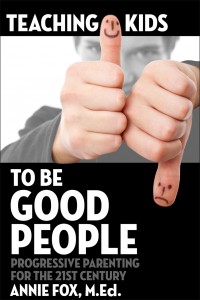|
|
February 6, 2013
 "I'm sorry, Daddy. I didn't know." When a very young child intentionally hurts another, how do we respond? With outrage and anger? Threats and intimidation? None of the above. Young children are ignorant, as in, they don’t know any better. Instead of shouting, a caring adult needs to step in and say to the child, “When you do that, you hurt others. When you hurt others you hurt yourself. The next time you feel so upset that you feel like doing harm, come to me. Let’s talk and work together. I can help you learn to handle those big feelings in safer ways, so that you can be a helper, not a hurter.”
When adults treat children in this respectful, compassionate way, children learn to be compassionate. But when adults respond to a child’s ignorance with anger…. how can they possibly learn about compassion?
When older children and adults behave cruelly it’s harder to view their actions through the “ignorance” lens, but it still applies. When we intentionally harm others, we are, in that moment, blindly ignorant of the hurt we cause. If, in that moment of harming, we had known better we would have done better. That’s why, whenever we get our buttons pushed and are about to lose it we need to calm down and wake up just enough to recognize the damage we are contemplating. And in that moment of pause, we realize that we do, indeed, know better.
All teachers are not parents, but all parents are teachers. Teaching kids to be good people includes teaching them how to manage their destructive emotions in constructive ways. When we witness cruelty between kids we need to summon compassion. Through our compassion for their ignorance we can help children become wiser.

January 23, 2013
I originally wrote a version of this article for TakePart.com where I contribute a weekly education post. Check out the rest of my articles there.
 ... because it's not helping Do you know the Yiddish verb, to kvetch? On the surface it simply means: to complain. As in, “Just get your homework done and stop kvetching already.” But actually, kvetching goes beyond complaining into the realm of eternal dissatisfaction where nothing is ever good enough and it becomes one’s mission in life to let everyone know exactly where and why things don’t measure up.
No one is a happy camper all the time. It’s not realistic to expect to be and it’s certainly not a requirement. And yet we keep on expecting it, don’t we? Especially those of us fortunate enough to live pretty well. When reality doesn’t meet our impossible standards we may not be able to keep our mouth shut. Of course, speaking up can be the first step toward positive change. It can also help build self-respect and healthier relationships. Which is why, when a teen bitterly complains to me about a friend who isn’t acting like one, I counsel the teen to go on record and tell the friend, “This isn’t OK and here’s why.”
What’s the alternative? Staying silent? That’s not likely to improve a relationship. So, yes, sometimes we need to complain.
But what do you do if your child constantly complains?
- “That’s stupid!”
- “This isn’t what I wanted!”
- “You can’t make me!”
- “That’s unfair!”
- “This sucks!”
What if your child’s negative attitude permeates everything?
I realize that finding fault may be an essential part of becoming a young adult. Unlike little kids who try to emulate their godlike parents, t(w)eens have begun the hard work of establishing their own unique identity, as different from us parents as imaginable. Teen negativity is often a display of independence, plain and simple. This may help us understand where it’s coming from, even though it doesn’t make the attitude any more fun to be around.
If your kid has gotten into the habit of grousing s/he may outgrow it. (We can always hope!) But hope isn’t an especially effective parenting strategy and a negative attitude can pollute your family life. Rather than lashing out in frustration or suffering silently, I suggest a direct intervention that will, at the very least, give your child insight into what it’s like to live with constant griping. I tackle the issue in my book Teaching Kids to Be Good People. This brief synopsis offers some tips on how to start turning around a negative attitude:
Conversation That Counts
Some complaints are helpful; some aren’t. Discuss with your child the concept of complaining. Point out that some complaints are helpful. (“The roof is leaking on my head.” “We’re out of toothpaste again.”) These can become action points. Other types of complaints aren’t intended to be helpful. They’re simply a chance to vent or to blame. (“This assignment is boring!” “Why did I get her for a sister?” “You kids never do anything right!”)
Reverse role-play. Tell your child that you’re going to “act out” one (unhelpful) complaint that you regularly hear from him/her. Be realistic in your dramatization, but not unkind. Remember you’re trying to teach, not wound. Now ask your child to act out an unhelpful complaint s/he regularly hears from you. (Yes, this lesson is a two-way street.)
How bad is the habit we’ve gotten into? Discuss the regular grumbling and whining amongst family members that aren’t meant to be helpful. What impact does it have? What might family life be different if there were less complaining?
Make a change. Challenge each family member to catch him/herself (not anyone else) in the act of complaining and try one of these responses instead:
a) Communicate directly about what needs to be done.
b) Skip the complaint and do some or all of what needs to be done (on your own).
c) Change what you can change and change your attitude about the rest.
Call another family meeting in a week to report on the progress everyone has made in creating a more cooperative atmosphere. We’re into a new year. How about working together to keep moving in a positive direction? It’s worth a try.

December 28, 2012
 FREE download for December 28-30, 2012, ''Teaching Kids to Be Good People'' by Annie Fox, M.Ed. Today (12/28) through Sunday (12/30), we’re giving away the Kindle version of my new parenting book Teaching Kids to Be Good People: Progressive Parenting for the 21st Century.
No Kindle? No problem. Download the ebook anyway because you can read it just fine on your PC, Mac, iPod Touch, iPhone, iPad, Android, Blackberry, and Windows Phone 7 with Amazon’s free Kindle Reader app.
Not in the US? Here are the Amazon links for Canada, UK, Australia, Brazil, France, Germany, Italy, Japan, Spain
Please accept this ebook as my gift to you and your family. Interested in the print edition? Learn more here.
Best wishes for a happy, healthy New Year, from our home to yours.

December 26, 2012
My friend and digital kids’ author, Karen Robertson, whose work includes the Treasure Kai series plus the Author’s Guide to Book Apps, contacted me about “The Next Big Thing.” Essentially it’s a “blog chain” for writers to help fellow writers get some buzz about their latest books and/or upcoming projects. Anything that helps me promote my work and simultaneously allows me to shine a light on other people’s writing sounds like a winner. “Sure!” I told Karen. “I’m in.”
She sent me 10 questions to answer. She’s linking to my blog from hers and, in turn, I’m supposed to link to the blogs of writers to whom I’ve reached out. Only one snag. At the moment, none of the 10 writers I’ve pitched the idea to have responded to me. I chalk it up as part of a well-deserved holiday slacker attitude. (Not even sure why I’m blogging today, except that I promised Karen and I’m big on keeping agreements.) When my writer friends get around to reading the email I sent them a week ago and decide to jump into The Next Big Thing, I’ll update this blog and link to their sites. In the meantime, here are my answers to the 10 questions. It was fun to answer them. Hopefully, you’ll find something interesting in what I have to say here.
 We can't parent without a game plan. Here's a good one. 1) What is the title of your latest book? Teaching Kids to Be Good People: Progressive Parenting for the 21st Century. It was published in October, 2012.
2) Where did the idea come from for the book? Well, we sure need more good people in the world. Can’t have too many of them… ever! But right at this point in history, I’d say we’re dealing with a world that is speedier, noisier, and in many ways more “I, Me, Mine” than ever before. Good people are desperately needed. Definition of a good person? Well, in my book… (and this is my book) a good person is one who looks for opportunities to do good in the world and has the social courage to act on those good intentions.
3) What genre does your book fall under? Non-fiction, parenting. But on a much broader level, this is a book about emotional intelligence and the tools to resolve issues from our own childhood so each of us may move forward toward a healthier relationship with ourself, our parents, our children, and everyone else. This may actually be a book about creating world peace. (Wow, that was a bigger answer than the “genre” question, wasn’t it?)
4) What actors would you choose to play the part of your characters in a movie rendition? I get that this question was devised for fiction writers, but I’ll take a sincere crack at it. Since the basis of my book is 32 personal essays, I’d say the best person to play the lead character in the movie rendition of Teaching Kids to Be Good People would have to be me. But I could totally do it! I was voted Class Actress in high school and I’ve done tons of community theatre. I already know all the lines, so I’m ready!
5) What is the one-sentence synopsis of your book? We desperately need more good people and they’re going to come from parents with a game plan. Teaching Kids to Be Good People is the game plan. (OK, that was two sentences. Sorry.) Here’s a free excerpt of Chapter 1, just to give you a taste of what this is all about.
6) Was your book self-published or represented by an agency? Electric Eggplant (which is my husband, David Fox, and me) published Teaching Kids… So, the answer is self-published. And I say that with no small amount of pride. The book looks and reads like the professional product it is.
7) How long did it take you to write the first draft of the manuscript? About a year, though many of the essays were originally written in other forms within the past five years. Two-thirds of the book is brand new content. Even with the “older” stuff, I had to get in there and re-work each essay because a) I’m a compulsive editor and b) I’m a better writer than I was when I first wrote them. I’ll be a better writer tomorrow than I am today. If I were to revisit this book a year from now, I’m sure I’d find ways to take it to still another level. But at some point you have to say, “This is good. I stand by it as is.” And then you put it out there in the world. I’m gratified by the enthusiastic reviews the book has received so far.
8) What other books would you compare this story to within your genre? There are hundreds of top-notch parenting books out there, with more coming to market each month. It’s a very competitive genre to be publishing in. Many of these books are written by MDs, and PhDs and are very helpful to very specific parenting challenges like: parenting kids with special needs, parenting adoptive kids from “hard” places, step-parenting, etc. My book is for all parents who recognize that their #2 objective (after keeping their children safe and healthy) is to help kids develop into people of good character.
9) Who or what inspired you to write this book? I’ve been answering email questions from tweens and teens since 1997. More and more of their questions reflect a huge gap in their understanding of how to treat themselves and others with compassion and respect. I wrote the book because kids have told me (in so many words) that they need tools to help them develop a moral compass. I wrote the book to help parents help their kids on their journey into young adulthood and beyond. A big part of the challenge parents have is in the area of communication. We wrongly assume that adults and kids mean the same thing when we use words like “fair” “mean” “love” “trust” “friendship.” That ain’t necessarily so. Parents need to do whatever it takes to get on the same page as their children (no small feat when our kids spend 24/7 mind-melded with their peers). My book offers parents new ways to see 21st century life from the eyes of their kids and provides guidelines to Conversations that Count. We need to listen to each other so a kid’s perspective is part of every parent’s frame of reference and a parent’s perspective is part of the mix inside a kid’s head when s/he is making choices amongst peers.
10) What else about the book might pique the reader’s interest? Read it and you’ll learn more about yourself and your kids. Then you’ll be able to use what you learn to be the kind of parent you have always wanted to be.
 — Older Posts »
| |















